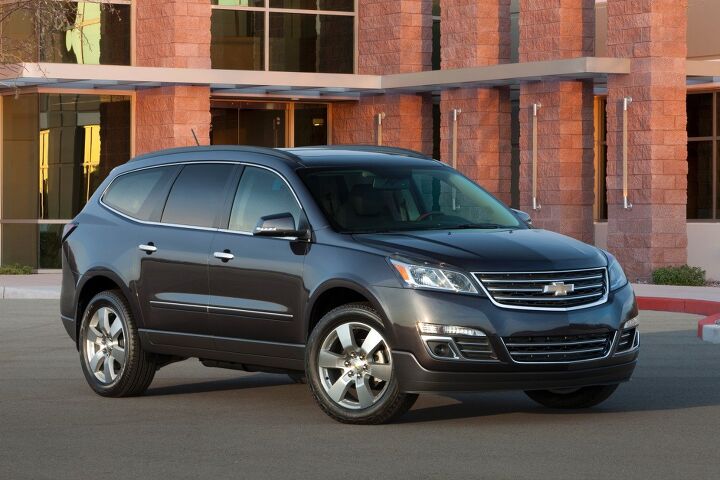#nhtsa
Four Automakers Make a Deal With California Regarding Vehicle Emissions
While we’ve dinged the media for erroneously reporting that automakers were unilaterally “backing” California in the fuel-economy fracas that’s currently taking place within American politics, it appears four of them actually are starting to choose a side. However, this again requires a bunch of clarification. Despite not adhering fully to the state’s ideal emissions scenario, Ford Motor Co., BMW Group, Volkswagen Group, and Honda Motor Co. released a joint announcement stating they have reached a voluntary agreement with the state of California to adopt compromised vehicle emissions rules.
Since there’s nothing binding in the joint agreement and automakers make (and break) promises all the time, the deal is largely meaningless. Doubly so, since the fuel-economy rollbacks have yet to be finalized. But this does illustrate how a handful of manufacturers are willing to accommodate others in order to get a nationwide solution. It also shows a softening of California’s previously ironclad environmental stance, which is much more interesting.
Transmission Trouble: Report Claims Ford Knew Focus/Fiesta DSP6 Was Defective
Making a mistake while trying to remedy an earlier one is a routine part of the human condition. We’re imperfect creatures and sometimes the easiest solution after a string of foulups is to just sweep something under the rug and hope nobody ever bothers to look there — even though they probably will. Incredibly, this logic can spread to an entire organization and with roughly the same effectiveness.
Earlier this week, Ford issued a safety recall on select Focuses manufactured within the last decade (1.5 million were recalled previously). But not before becoming the subject of a scathing report from the Detroit Free Press claiming the automaker knew the cars had bunk transmissions and did everything in its power to keep that under wraps in order to continue selling them.
Mild Misinformation About the Gas War: Governors Unite, Automakers Compromise
On Tuesday, 23 governors signed a joint statement urging the Trump administration to reconsider the proposed rollback of Obama-era fueling regulations. Led, unsurprisingly, by California Governor Gavin Newsom, the letter suggests a “common-sense approach” to national requirements with an emphasis on rising standards.
A minor update in the gas war to be certain — and yet annoyingly framed by a large portion of the media as a victory for California when the realities are far more complicated. To be frank, we’re getting pretty tired of these lopsided takes. This whole thing is a regulatory and political quagmire… on all sides.
Gas War Watch: EPA and CARB Leadership Won't Even Share the Same Table
Capitol Hill was the scene of some high-school drama this week after representatives from the Environmental Protection Agency (EPA) and the California Air Resources Board (CARB) reportedly refused to sit at the same table while discussing fueling regulations with the U.S. House Energy and Commerce Committee.
As petty as this seems, it illustrates the overall situation rather well. White House officials terminated talks with California in February, citing an inability to progress the debate. Meanwhile, CARB has been claiming the Trump administration doesn’t want to hear its case and has instead sought to strip the state of its ability to self regulate in order to pass reforms that would freeze national emissions standards at 2020 levels though 2026.
Thursday’s congressional bickering helped paint a clearer picture of what the communications breakdown looked like.
Gas War Watch: UAW Goes to Congress, Sides With Automakers on Fuel Economy Rollback
The United Auto Workers is spending Thursday telling Congress that the union opposes the Trump administration’s proposal to freeze fuel efficiency requirements at 2020 levels through 2026… sort of. While the UAW expressed moderate environmental concerns in the past, most of its opposition to the rollback has revolved around corporate investments into the industry. In fact, the union’s research arm called fuel economy the auto industry’s “future” in 2018.
This time around, the UAW seems to be singularly focused on business aspects. According to a prewritten testimony, UAW Legislative Director Josh Nassar intends to tell two subcommittees of the U.S. House Energy and Commerce Committee that the union is in line with automakers’ concerns about the proposal leading to “protracted litigation and uncertainty in the industry that will limit growth.”
With New Technology Comes New Ways to Die
Since 2005, 37 deaths by carbon monoxide poisoning have been attributed to vehicles with keyless ignitions that were inadvertently left running. Automatic engine shutoff is not currently mandated by the National Highway Traffic Safety Administration, so manufacturer’s application of the technology is sporadic. But the PARK IT Act wants to change that.
NHTSA Estimates Minor Improvement in Roadway Fatalities for 2018
The National Highway Traffic Safety Administration has released its preliminary report on how many people died on U.S. roadways in 2018, indicating that overall traffic deaths had likely fallen by 1 percent. While the information doesn’t exactly justify a party, it’s good news after the last few years attempted to provide new footage for the Red Asphalt series.
As the first major spike in traffic deaths since the “Swinging Sixties,” 2015 freaked everyone out a bit. Save for a few annual hiccups, American traffic deaths (contrasted with its population) had been on the decline for decades. However, by the end of 2016, things looked certain — it was becoming less safe to drive in the United States.
Did GM's Seat Belt Recall Fix the Problem? Feds Intend to Find Out
A half-decade after General Motors recalled 1,339,355 full-size crossovers due to a risk of seat belt failure, the National Highway Traffic Safety Administration has launched an investigation into the models.
Following reports sent in from owners, the federal agency is concerned that the 2014 recall did not fix the problem of detached front seat belt cables in 2009-2014 vehicles.
Feds Pull a U-turn on Mandatory Brake-Throttle Override
A decade after a well-publicized fatal crash involving a Lexus ES 350, the National Highway Traffic Safety Administration has withdrawn a proposal calling for mandatory brake-throttle override systems.
The NHTSA proposed the regulation after several incidents involving Toyota vehicles with jammed accelerator pedals, but now the federal agency says it’s no longer needed. Automakers responded in the absence of a hard rule, eventually equipping all vehicles with the feature. Problem solved?
Not so fast, say safety advocates.
Automotive Trade Group Hopes to Keep Colorado From Following California's ZEV Rules
It’s no secret that California plans to ignore any federal ruling that soften emissions regulations on automobiles. The state’s already suing the Environmental Protection Agency and National Highway Traffic Safety Administration over the data used to justify the Trump administration’s proposed rollback of vehicle emission standards. It has also recruited leadership in other states to join the cause and adopt its zero-emission-vehicle strategy.
Colorado Governor Jared Polis has already signed an executive order directing the state to follow California’s path — joining with Maryland, Massachusetts, New Jersey, New York, Oregon, and other participating states toward a common cause. However, the battle isn’t over yet. Industry lobbyist are hard at work changing minds, and the Alliance of Automobile Manufacturers (AAM) seems to be making progress with Colorado.
Federal Probe Covers 12.3 Million Vehicles; Airbags May Not Deploy in a Crash
The National Highway Traffic Safety Administration has launched an investigation into a slew of late-model vehicles equipped with airbags that may not protect occupants in the event of a crash. The vehicles, built by American, Japanese, and Korean automakers, were all manufactured between 2010 and 2019.
According to the NHTSA, the faulty airbags may be responsible for eight deaths.
NHTSA Probing Nissan Rogues That Brake for No Reason
Nissan added automatic emergency braking as standard equipment on eight popular models for the 2018 model year, looking to get a jump on the pact forged in 2016 that calls for mandatory AEB on all cars and light trucks by 2020.
That pact, covering 20 automakers, the National Highway Traffic Safety Administration, and the Insurance Institute for Highway Safety, is already bearing fruit. Just last month, the NHTSA congratulated a slew of automakers, including Nissan, for including the safety feature on the majority of their vehicles.
One month later, and the NHTSA finds itself investigating Nissan for a potential fault with its AEB system.
NHTSA Opens Probe Into 3 Million Hyundai and Kia Vehicles Over Fires; Veloster Recalled Over Stalling Issue
This isn’t an April Fools joke, sadly, for Hyundai and Kia Motors. After years of investigations and the recall of over 2.3 million models, Hyundai’s engine controversy has sparked a National Highway Traffic Safety Administration Agency probe into nearly 3 million vehicles.
Immediately preceding the weekend, Hyundai recalled 16,487 Velosters to mend a software glitch that could lead to stalling and fires. The automaker just can’t seem to turn down the heat on a quality issue that simmered for years before boiling over.
Trump's No Fan of Autonomous Vehicles, Like Most Other People
Donald Trump apparently belongs to the 71 percent of Americans who remain averse to the thought of riding in self-driving cars. It’s a position that appears to be incongruous with the National Highway Traffic Safety Administration’s deregulation strategy. But there’s always a little room for someone’s personal preference to exist in tandem with public policy. At least, there used to be.
Considering the president’s involvement in American industrial matters routinely make him the central focus of auto-related topics, we’ll keep this one relatively brief. But the accompanying details of this story are too interesting to simply ignore.
Feds Jump in to Investigate Two Fatal Tesla Crashes
Two fatal Tesla crashes in Florida last week, one of which bears a striking similarity to an earlier 2016 crash, have the NHTSA and NTSB on their toes.
While both federal safety agencies are looking into Friday’s West Delray, Florida collision, which involved a Model 3 and transport truck, only the National Highway Traffic Safety Administration is probing the previous Sunday’s Davie, Florida crash. Both groups want to know if Autopilot was turned on at the time of impact.





























Recent Comments